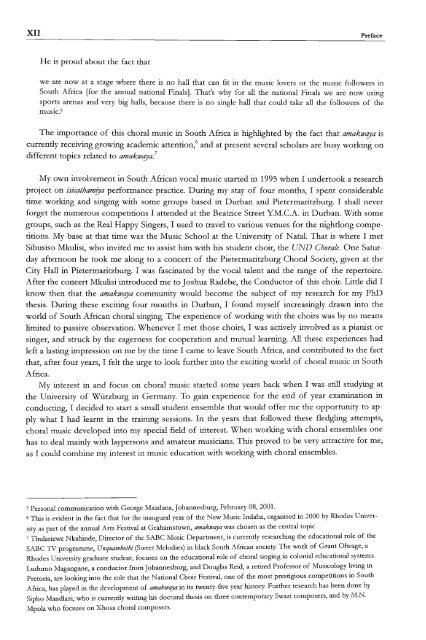South African Choral Music (Amakwaya): Song, Contest and the ...
South African Choral Music (Amakwaya): Song, Contest and the ...
South African Choral Music (Amakwaya): Song, Contest and the ...
Create successful ePaper yourself
Turn your PDF publications into a flip-book with our unique Google optimized e-Paper software.
XII<br />
He is proud about <strong>the</strong> fact that<br />
Preface<br />
we are now at a stage where <strong>the</strong>re is no hall that can fit in <strong>the</strong> music lovers or <strong>the</strong> music followers in<br />
<strong>South</strong> Africa [for <strong>the</strong> annual national Finals]. That's why for all <strong>the</strong> national Finals we are now using<br />
sports arenas <strong>and</strong> very big halls, because <strong>the</strong>re is no single hall that could take all <strong>the</strong> followers of <strong>the</strong><br />
music. 5<br />
The itnportance of this choral music in <strong>South</strong> Africa is highlighted by <strong>the</strong> fact that amakwqya is<br />
currendy receiving growing academic attention,6 <strong>and</strong> at present several scholars are busy working on<br />
different topics related to amakwqya. 7<br />
My own involvement in <strong>South</strong> <strong>African</strong> vocal music started in 1995 when I undertook a research<br />
project on isicathamfya performance practice. During my stay of four months, I spent considerable<br />
time working <strong>and</strong> singing with some groups based in Durban <strong>and</strong> Pietermaritzburg. I shall never<br />
forget <strong>the</strong> numerous competitions I attended at <strong>the</strong> Beatrice Street YM.C.A. in Durban. With some<br />
groups, such as <strong>the</strong> Real Happy Singers, I used to travel to various venues for <strong>the</strong> nighdong competitions.<br />
My base at that time was <strong>the</strong> <strong>Music</strong> School at <strong>the</strong> University of Natal. That is where I met<br />
Sibusiso Mkulisi, who invited me to assist him with his student choir, <strong>the</strong> UND <strong>Choral</strong>e. One Saturday<br />
afternoon he took me along to a concert of <strong>the</strong> Pietermaritzburg <strong>Choral</strong> Society, given at <strong>the</strong><br />
City Hall in Pietermaritzburg. I was fascinated by <strong>the</strong> vocal talent <strong>and</strong> <strong>the</strong> range of <strong>the</strong> repertoire.<br />
After <strong>the</strong> concert Mkulisi introduced me to Joshua Radebe, <strong>the</strong> Conductor of this choir. Litde did I<br />
know <strong>the</strong>n that <strong>the</strong> amakwqya community would become <strong>the</strong> subject of my research for my PhD<br />
<strong>the</strong>sis. During <strong>the</strong>se exciting four months in Durban, I found myself increasingly drawn into <strong>the</strong><br />
world of <strong>South</strong> <strong>African</strong> choral singing. The experience of working with <strong>the</strong> choirs was by no means<br />
litnited to passive observation. Whenever I met those choirs, I was actively involved as a pianist or<br />
singer, <strong>and</strong> struck by <strong>the</strong> eagerness for cooperation <strong>and</strong> mutual learning. All <strong>the</strong>se experiences had<br />
left a lasting impression on me by <strong>the</strong> time I came to leave <strong>South</strong> Africa, <strong>and</strong> contributed to <strong>the</strong> fact<br />
that, after four years, I felt <strong>the</strong> urge to look fur<strong>the</strong>r into <strong>the</strong> exciting world of choral music in <strong>South</strong><br />
Africa.<br />
My interest in <strong>and</strong> focus on choral music started some years back when I was still studying at<br />
<strong>the</strong> University of Wiirzburg in Germany. To gain experience for <strong>the</strong> end of year examination in<br />
conducting, I decided to start a small student ensemble that would offer me <strong>the</strong> opportunity to apply<br />
what I had learnt in <strong>the</strong> training sessions. In <strong>the</strong> years that followed <strong>the</strong>se fledgling attempts,<br />
choral music developed into my special field of interest. When working with choral ensembles one<br />
has to deal mainly with laypersons <strong>and</strong> amateur musicians. This proved to be very attractive for me,<br />
as I could combine my interest in music education with working with choral ensembles.<br />
5 Personal communication with George Mxadana, Johannesburg, February 08, 200l.<br />
6 This is evident in <strong>the</strong> fact that for <strong>the</strong> inaugural year of <strong>the</strong> New <strong>Music</strong> Indaba, organised in 2000 by Rhodes Univer<br />
sity as part of <strong>the</strong> annual Arts Festival at Grahamstown, amakwqya was chosen as <strong>the</strong> central topic.<br />
7 Thulasizwe Nkabinde, Director of <strong>the</strong> SABC <strong>Music</strong> Department, is currently researching <strong>the</strong> educational role of <strong>the</strong><br />
SABC TV programme, Unquambothi (Sweet Melodies) in black <strong>South</strong> <strong>African</strong> society. The work of Grant Olwage, a<br />
Rhodes University graduate student, focuses on <strong>the</strong> educational role of choral singing in colonial educational systems.<br />
Ludumo Magangane, a conductor from Johannesburg, <strong>and</strong> Douglas Reid, a retired Professor of <strong>Music</strong>ology living in<br />
Pretoria, are looking into <strong>the</strong> role that <strong>the</strong> National Choir Festival, one of <strong>the</strong> most prestigious competitions in <strong>South</strong><br />
Africa, has played in <strong>the</strong> development of amakwqya in its twenty-five year history. Fur<strong>the</strong>r research has been done by<br />
Sipho M<strong>and</strong>lazi, who is currently writing his doctoral <strong>the</strong>sis on three contemporary Swazi composers, <strong>and</strong> by M.N.<br />
Mpola who focuses on Xhosa choral composers.

















